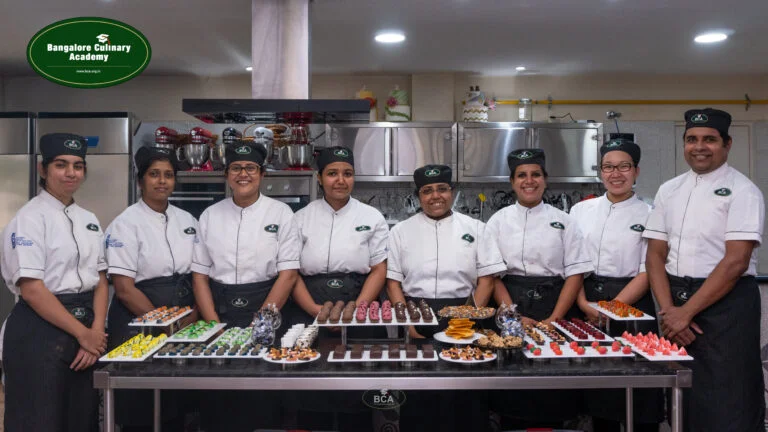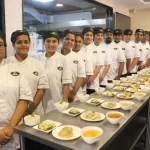
Pastry Chef Careers: Theoretical vs Practical View
When people hear the word “pastry chef,” most imagine someone decorating cakes or baking cookies. But in the world of professional kitchens—and any pastry chef course or diploma in culinary arts program—pastry is a broad and layered domain with multiple specializations. Just as some bakeries focus only on artisan sourdoughs or rich brioche, pastry chefs often build expertise in specific categories of sweet (and sometimes savory) delights.
In theory, culinary schools in India and textbooks break down pastry into clearly defined categories. But things work differently in practice, especially inside hotel kitchens. Let’s explore the varied types of pastry chefs and what those roles look like today.
The Classic Patissier: Foundation of Any Pastry Chef Course
The patissier is the traditional pastry chef. They’re often trained through a pastry chef course to produce a wide array of desserts—cakes, tarts, mousses, macarons, petit fours, tea cakes, and more. Their work focuses on technique, flavor balance, temperature control, and presentation.
- Training pathway: Most diploma in culinary arts curricula (whether at Bangalore Culinary Academy or a similar institute) begin by introducing students to foundational techniques in cold and hot desserts, sugar syrups, creams, mousses, compotes, and glazes.
- Trending adaptations: Patissiers today also learn to create gluten-free, eggless, and vegan desserts—an important skill set in any modern pastry chef course.
- Career outcome: Almost every pastry chef starts here before branching into other specialties within a bakery diploma course or advanced confectionery training.
This role forms the foundation of most pastry careers, whether you graduate from a local institute in Bangalore or pursue a postgraduate program in international pâtisserie.


Chocolatier Specialization in a Pastry Chef Course
Working with chocolate is both an art and a science. Chocolatiers go far beyond simply tempering and molding. They craft filled bonbons, pralines, chocolate truffles, and even complex sculptures or centerpieces. Their work often intersects with the world of confectionery, which includes both chocolate and sugar artistry.
- Specialized skills: In any leading pastry chef course, you’ll learn how temperature, humidity, and fat content affect chocolate. You’ll master tools like polycarbonate molds, dipping forks, and enrobing machines.
- Professional contexts: In luxury hotels or top chocolateries, chocolatiers often create holiday specials, wedding favors, and high-end retail products. Graduates of a diploma in culinary arts who focus on chocolate can quickly find roles in five-star hotel boutiques or specialty patisseries.
Local advantage: A pastry chef course in Bangalore emphasizes hands-on, locally oriented techniques, especially if you want to master Indian-style chocolates and fusion confections.
Mastering Laminated Doughs: Viennoisier in a Bakery Diploma Course
One of the most technical and often underrated roles, the viennoiserie works with laminated and enriched doughs. This includes croissants, Danish pastries, pain au chocolat, kouign-amann, and brioche.
- Laminated dough technique: Students in a bakery diploma course or dedicated viennoiserie module practice laminating dough with layers of butter, using precise folding, chilling, and proofing techniques. Even a small variation in temperature or rolling can significantly impact the flakiness and rise of the final product.
- Curriculum highlights: A quality pastry chef course, whether it’s a short-term workshop or a full diploma in culinary arts, will dedicate at least 50–80 hours solely to viennoiserie skills, ensuring you understand dough temperature management, lamination ratios, and proofing timelines.
Real-world output: Many high-end bakeries and hotel buffets in Bangalore rely on viennoiseries to create beautiful breakfast spreads and tea-time treats. If you graduate with a bakery diploma course endorsement, you’ll be well-equipped to join a boulangerie team or even run a small artisan bakery.
Role of a Boulanger: Bread Specialist in Culinary Diploma Programs
A boulanger is a bread specialist. While traditionally considered separate from pastry, in modern kitchens the line often blurs—especially in India and Southeast Asia, where hotel kitchens commonly merge pastry and bakery departments.
- Focus areas: The boulanger concentrates on sourdoughs, baguettes, focaccia, ciabatta, rye breads, and other artisanal loaves. They understand fermentation times, hydration levels, and how to build flavor using natural leavening methods. Some also work with specialty breads like multigrain, gluten-free, or flavored varieties.
- Skillset expansion: For a pastry chef, gaining bakery diploma course credentials is a major asset. It widens job prospects and enhances versatility, enabling you to work in both the pastry section and the bread station of any professional kitchen.
Comparative programs: While some institutes emphasize a broad-based approach in their culinary diploma courses, Bangalore Culinary Academy offers a dedicated bakery diploma course track that delves deeply into fermentation science and advanced bread-making techniques.



Five-Star Hotel Kitchens: Why Your Pastry Chef Course Must Be Versatile
In culinary theory—especially as taught in any diploma in culinary arts textbook—there’s often mention of even more specialized roles: frozen dessert chefs, sugar artists, or cold dessert specialists. However, such separation is rare in five-star hotel kitchens, especially in India and the Asia-Pacific region.
- Merged departments: The pastry and bakery sections are generally combined, and chefs are expected to contribute across multiple areas—from preparing breads for breakfast buffets to plating desserts for dinner service.
- Adaptive skillset: In a pastry chef course or bakery diploma course at Bangalore Culinary Academy, students learn how to pivot quickly: one morning you might finish laminated doughs, by afternoon you’re plating tiramisu, and by evening you’re tempering chocolate for bonbons.
Local market context: Indian hotel chains (like Taj, ITC, and The Oberoi) often seek chefs who are comfortable filling multiple roles. As a result, graduates of any reputable culinary school in India—be it Bangalore Culinary Academy or another institute—must be adaptable.
Training for Real-World Kitchens
Culinary diploma courses today are designed with this reality in mind. Students aren’t trained for just one niche—they’re introduced to everything: pastry, bakery, chocolate, and plating.
Key practical subjects covered in most “diploma in culinary arts” or “professional culinary diploma course” programs:
- Kitchen hygiene and workflow: Managing a commercial kitchen’s sanitation standards, often aligned with HACCP guidelines.
- Ingredient sourcing and costing: Learning how to price menu items accurately—an essential skill if you want to open a café or bakery.
- Food photography and presentation: Mastering the basics so your desserts look stunning on social media.
- Entrepreneurial skills: Many students aspire to launch their dessert studios or bakeries right after completing a pastry chef course.
- Pressure cooking: Understanding that in real kitchens, timelines are tight and quality must remain consistent.
Whether you pursue a dual-degree in culinary arts (as offered by some international partnerships) or enroll in a single diploma event management elective alongside your main pastry track, the goal is to bridge classroom knowledge with real-world demands.
Bridging Skills for a Future-Focused Career
While specialization can develop over time, such as focusing exclusively on chocolate or bread, having a well-rounded foundation is essential. A chef who understands all areas of pastry and bakery, as taught in any comprehensive bakery diploma course or pastry chef course, can walk into any kitchen, hotel, restaurant, cruise ship, or boutique bakery—and immediately contribute.
- Leadership & entrepreneurship: With a diploma in culinary arts, you can grow into leadership roles (e.g., Executive Pastry Chef at a five-star hotel) or become the founder of your dessert studio.
- Versatility matters: In Bangalore’s crowded culinary scene, where institutes compete, versatility sets you apart. A chef equally adept at creating sourdough loaves, plated desserts, and chocolate bonbons will always be in demand.
Career trajectories: Today’s top pastry chefs often wear multiple hats—acting as cake artists, chocolate sculptors, bakery managers, and business owners all at once.
Pastry Is More Than Just Cakes
Being a pastry chef today is about much more than baking. It’s about craft, precision, adaptability, and innovation. Whether your passion lies in crisp croissants (taught in your bakery diploma course), hand-crafted bonbons (covered in a pastry chef course), or beautifully plated vegan desserts (part of a modern diploma in culinary arts), there’s space for you in the evolving world of pastry.
If you’re considering a pastry career, focus on building a wide base of skills—whether at Bangalore Culinary Academy or another reputable institute. Stay curious, don’t shy away from experimenting, and explore every module—from diploma in hotel management electives to advanced chocolate artistry. From there, you can specialize—or remain versatile—depending on where your career (or creativity) takes you.
